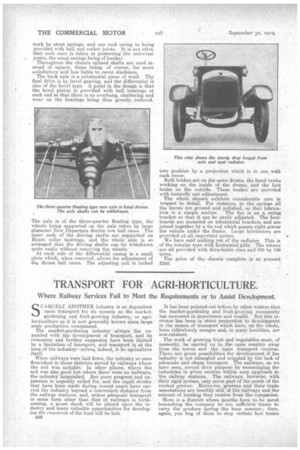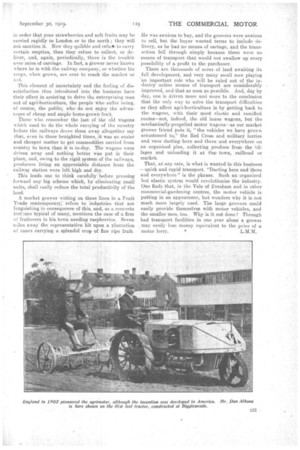TRANSPORT FOR AGRI-HORTICULTURE.
Page 10

Page 11

If you've noticed an error in this article please click here to report it so we can fix it.
Where Railway Services Fail to Meet the Requirements or to Assist Development.
SCARCELY ANOTHER industry is so dependent . upon transport for its success as the marketgardening and fruit-growing industry, or agrihorticulture as it is now generally known since large scale production commenced.
The market-gardening industry 'always has expanded with the development of transport, and its
extension and. further expansion have been limited by a limitation of transport, and transport is at the base of the-industry—unless, indeed, it be agriculture itself.
When railways were laid down, the industry at once flourished in those districts served by railways where the soil was suitable. In other places, where the , soil was also good but where there were no railways, the industry languished. But more progress and expansion is urgently called for,'and the rapid strides
that have been made during recent years have car ried the industry beyond a convenient distance from the railway stations, and, unless adequate transport in some form other than that of railways is forthcoming, a great check will be placed upon the industry and many valuable opportunities for developing the resources of the land will be lost.
1330 • It has been pointed out before by other writers that the Market-gardening and fruit-growing Community has increased in importance and wealth. But this increase has been in strict proportion' to development in the means of transport which have, an the whole, been ridiculously meagre and, in many localities, are non-existent.
The work of growing fruit and vegetables must, of necessity, be carried on in the open country away from the towns and the main transport -centres. There are great possibilities for development if the industry is not stra.ngled and crippled by the lack of adequate and cheap transport. The railways, as we have seen, served their purpose by encouraging the industries in given centres within easy approach to the railway stations. The railways however, with their rigid system, only serve part of the needs of the msrket grower. Moreover, growers and their trade associations are heartily sick of the railways and amount of humbug they reeeive from the companies.
Here is a district where months have to be spent. beseeching the company to run sufficient trains to carry the produce during the busy seasons ; then, again, you beg of them to stop certain fast trains
in order that your strawberries and soft fruits may be carried rapidly to London or to the north ; they will not sanction it. Now they quibble and ref toe to carry certain empties, then they refuse to collect, or deliver, and, again, periodically, there is the trouble over rates of carriage. In fact, a grower never knows where he is with the railway company; or whether his crops, when grown, are ever to reach the market or not.
Thiselement of uncertainty and the feeling of dissatisfaction thus introduced into the business have their effect in assisting to drive, the enterprising man out of agri-horticulture, the people who suffer being, of course, the public; Who• do not enjoy the advantages of cheap and ample home-grown fruit, Those who remember the last of the old wagons 'which used to do the whole carrying of the country before the railways drove them away altogether say that, even in those benighted times, it was an easier and cheaper matter to Set commodities carried from country to town than it is to-day. The wagons. were driven away and nothing better was put in their place, and owing to the rigid system of the railways, producers living an appreciable distance from the railway station were left high and dry.
This leads one to think carefully before pressing forward any big scheme which, by eliminating small units, shall really reduce the total productivity of the land.
A market grower writing on these lines in a Fruit Trade contemporary, refers to industries that are languishing in consequence of this, and, as a concrete instance typical of many, mentions the case of a firm or fruiterers in his town needing raspberries. Seven miles awaythe representative hit upon a plantation of canes carrying a splendid Crop of fine ripe fruit. He was anxious to buy, and the growers were anxious to sell, but the buyer wanted terms to include delivery, as he had no means of cartage, and the transaction fell through simply because there were no means of transport that would not swallow up every possibility of a profit to the purchaser.
There are thousands of acres of land awaiting its full development, and very many small men playing "an important role who will be ruled out of the industry unless means of transport are considerably improved, and that as soon as possible. And, day by day, one is driven more and more to the conclusion that the only way to solve the transport difficulties as they affect agri-horticulture is by getting back to the wagons, with their most elastic and ramified routes—not, indeed, the old horse wagons, but the mechanically-propelled motor wagons—as our market grower friend puts it "the vehicles we have grown accustomed to," the Red Cross and military lorries and vans darting • here and there and everywhere on an organized plan, collecting produce from the villages and unloading it at the town, railhead or market.
That, at any rate, is what is wanted in this business --quick and rapid transport. "Darting here and there and everywhere" is the phrase. Such an organized but elastic system would revolutionize the industry. One finds that, in the Vale of Evesham and in other commercial-gardening centres, the motor vehicle is putting in an appearance, but wonders why it is not much more largely used. The large growers could easily provide themselvea with motor vehicles, and the smaller men, too. Why is it not done? Through bad transport facilities in one year alone a growet may easily lose money equivalent to the price of a motor lorry. L.M.M.






























